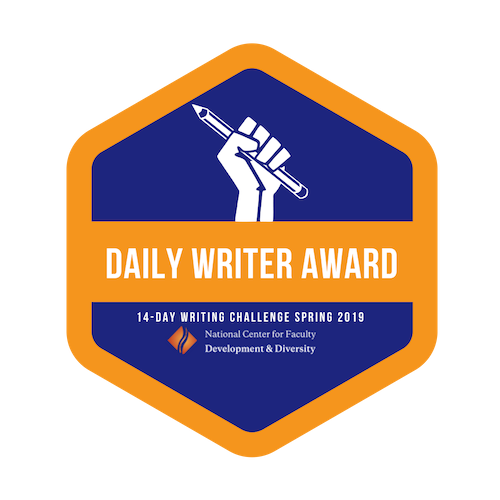As a second-time graduate student returning to academia after several years in the workforce, I’m always interested in increasing my work efficiency. Spending nearly every waking moment on homework caused me to burn out on school eight years ago, after all, so I’d like to avoid that again. I’ve also got friendships, relationships, and hobbies to maintain, so increasing my efficiency so that I can spend more time doing these other things is important for me. To paraphrase one of my former coworkers at Roswell, I’m not interested in working harder anymore, but smarter.
Which is why I recently participated in a 14-day writing

This
If I’ve learned anything about being in grad school again though, it’s that I’m prone to distraction. Part of it is simply the proliferation and availability of material online, but my previous job also influenced my working habits. Since there were always a thousand things going on at the museum that needed to get done, I rarely had an uninterrupted afternoon at my desk to write. More often than not, I would have to wedge in short blocks of writing time in between meetings, exhibition installations, or impromptu tours. Yet in spite of all that, I still managed to get my writing done within a 40-hour work week, and rarely took anything home.
Being back in grad school has forced me to be honest about my working habits. Without the museum to structure my day, I’m prone to create my own interruptions. I’m productive, but I don’t have the self-discipline to work for several hours without distracting myself. I really do want to spend my free time with Brandon, my friends, and my hobbies rather than fritter it away on the Internet, but on my own, that’s what happens. I signed up for the workshop, then, because I realized that my working sessions could use more structure.

The workshop was set up as an online forum, with several other people participating. I’m an early riser and tend to be most focused in the mornings, so I set 6:00 am as my start time. With the exception of one day when I let myself write for an hour, I stuck to the 30-minute limit, as the point was to see what I could accomplish in a short amount of time. Every day after writing, I would go to the login page, write down what I accomplished, the internal and external resistance I experienced, and what had gone especially well. Finally, I would go to the group page, check in on the progress of the other participants, and leave positive feedback on one of them. The only time I didn’t check in was on the weekends, which we were encouraged to take off (well, as much as you can let yourself).
So how did it go? Actually, I’m really pleased with how it turned out. Because I only had to work for 30 minutes, I was able to stay on track and didn’t feel the need to distract myself. Knowing I only had to work for a half-hour instead of three or four hours also meant I was more willing to tackle challenging parts of my writing, those spots where you know what you need to say but just can’t find the right way to do it. While 30 minutes may not seem like much time to spend writing, over the course of two weeks it added up. I managed to write and revise a conference paper I’m giving next month, write an assessment of an article I’d been asked to peer review, and write two precis for my Modern US class, all while having the benefit of starting my day on a productive note.
On reflection, this 30-minute timer method reminded me of the way I used to write in college. As an undergraduate, I listened to classical music when I wrote. When I’d go write or revise a text (I’m not so much a writer as I am a re-writer), I’d put on a CD, and work until the disc had finished. Each CD I had was more or less an hour, so I knew that I’d get an hour’s worth of work in by the time I had gone through the disc’s playlist.

This habit started to change the first time I went to graduate
If nothing else, this writing workshop has reminded me of the importance of structuring my time. If I want to spend more time with Brandon or my artwork, then I need to make sure I use my work time efficiently and not let my distractions stretch it out into the evening. Instead of expecting myself to work uninterrupted, I’ve accepted that I work better in shorter blocks, with little breaks in between. We all know that time is arbitrary, but measuring it can really help with staying focused. Whether it’s setting a timer, playing a CD, or some other quantifying method, I know now that I need to track my time and set goals for myself, not only for

Timer-based writing isn’t for everyone, but after seeing what I’ve been able to do with it, I think it’ll work just fine for me.